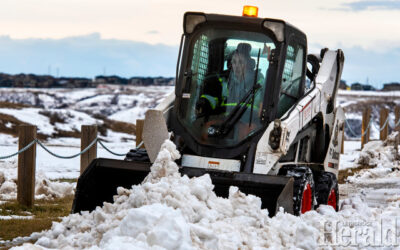Council approves enhanced snow clearing on pathways
By Al Beeber - Lethbridge Herald on March 25, 2022.
 Herald file photo
City worker Jolene Watson runs a Bobcat machine as she clears drifted snow during a past winter season.
Herald file photo
City worker Jolene Watson runs a Bobcat machine as she clears drifted snow during a past winter season.LETHBRIDGE HERALDabeeber@lethbridgeherald.com
City council on Tuesday voted unanimously to accept a recommendation from its Civic Works Standing Policy Committee that service level enhancements for snow and ice removal be approved.
The changes for removal of snow and ice for pathways along roadways involve moving Priority 3B routes for Priority 2 routes.
Deputy mayor Belinda Crowson told council the enhancements provide better service to city residents while working within the current budget. She gave kudos for city staff for developing the strategy.
Transportation general manager Darwin Juell said in response to a question from councillor John Middleton-Hope the new removal strategy would require an expenditure of $30,000 to purchase three snowblades for four-wheel-drive trucks that will be used.
Earlier this month, the SPC was told during a presentation by the Transportation and Parks departments that “the enhancement of snow and ice priorities for pathways along roadways aligns better with the policies of city council and expectations of the general public for more enhanced snow clearing of regional trails that are primarily along arterial roadways.”
The parks department presently uses small tractors called Toolcats as well as skid steer loaders and other small equipment to plow snow on roadways. It also has a snowblower to use in case of a heavy snow accumulation.
But a report submitted to the SPC said this equipment is slow and can’t clear freshly-accumulated snow before it packs down, refreezes and becomes harder to remove.
The report says not enough resources exist during a storm to take care of all priorities in a short time frame.
The report said currently three separate groups are conducting snow and ice removal along the same pathways so “the option of more efficient snow and ice control along pathways must be considered.”
Higher-speed plowing of regional pathways is more efficient and if started immediately after Priority 1 roadway plowing is done, would be easier to remove resulting in fewer resources spent to remove accumulated snow from regional pathways, said a submission given to the SPC which is a committee made up of council members.
SPCs make recommendations for council to address when it meets as an entirety.
“Narrow pathways and sidewalks would still be cleared with the traditional smaller equipment but in a higher priority, now a priority 2,” said the submission by Transportation general manager Darwin Juell and Parks and Cemeteries GM Blair Richter.
The pros to changes would be improved mobility in winter for pedestrians, cyclists and those with mobility impairments. Enhancing service would allow regional trail clearing to be done much quicker.
Only minimal financial implications would be seen because equipment is already owned by the City with the only new equipment needed would be several snow blades for trucks. Manpower, sanding material and vehicle use would increase but this would be funded through the current snow and ice control budget that has a surplus of about $1 million.
Snow and ice control services for City controlled roadways are generally handled by the Transportation Dept. while Parks handles pathways and sidewalks with both having an established service level where learning is done through various priorities.
The regional trail system has historically been cleared by Parks and has been a priority 3B for its 78 kilometres of trails, the majority which are next to arterial roadways. Those roads are plowed in a Priority 1 order which creates snow piles to plug intersections and pathways.
Transportation has started clearing these ramps along Priority 1 plow routes in a Priority 2 order to allow pedestrian activity as soon as possible after a snowfall. But with regional trails still being cleared in a Priority 3B order, this means pedestrians can endure difficulty traversing pathways and sidewalks after a snowfall. In the cases of those with mobility issues, some may not be able to use them at all.
Follow @albeebHerald on Twitter
4-3




